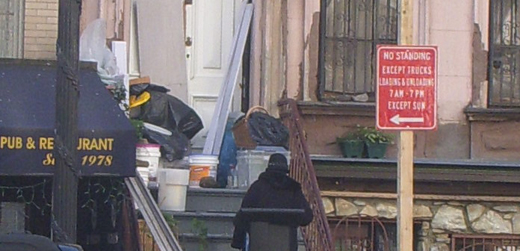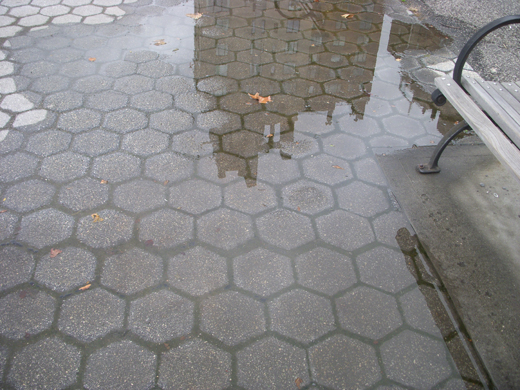Dear Diary: Miam
Thursday, December 24th, 2009
What made the capon so flavorful and succulent? Could it have been the inedible stuffing?
But was the stuffing — a mixture of chopped apples, chopped prunes, sauerkraut, and breadcrumbs — inedible? I forgot to scoop it out of the bird and serve it. My father-in-law, who gave me the idea, told me that he made it to stuff a goose, back in the Sixties (my father-in-law’s gustatory memory is prodigious). It wasn’t meant to be eaten, he told me. It was intended to flavor the bird, and to soak up some of the fat. When Kathlenn told him how moist the capon was, he attributed it to the sauerkraut, which steams the breast from within.
That makes sense. By the time the sauerkraut would have begun to steam, the skin, which I scrupulously basted every twenty minutes, was crisping nicely into impermeability. Finally, a stuffing to stick with! Perhaps even to eat, if I remember it.
My attention was distracted by the green-bean casserole. For years, I have wanted to recreate this yummy concoction of green beans, almonds, canned onion rings and Campbell’s cream of mushroom soup, without resorting to the mushroom soup. Yesterday, while checking out another recipe in The Way to Cook, I came across the perfect replacement, a mushroom sauce made of béchamel and duxelles. But of course!
The resulting dish (I omitted the almonds, because nuts don’t agree with everyone) was a success. At least, I thought it was. But I can see why it has dropped off menus as cooking standards have improved. Making that mushroom sauce took a while. The mushrooms had to be chopped very fine (boring!), and the milk had to boil just so. It was obviously something that ought to have been done in ahead of time. Memo to Self &c.
Completing the main course were staples of my kitchen: sautéed corn and roasted sweet potatos. The corn is seasoned with oregano and cooked in spoonfuls of butter and oil. I cut five or six sweet potatoes into chunks (bigger than bite-size) and put them in a very large bowl. After tossing them with oil, red wine vinegar, honey, and a liberal amount of crushed rosemary. I turn them into a large baking dish. Whenever I baste the bird, I turn the chunks with a spoon. They’re done in about seventy-five minutes.
Ordinarily, I serve a cream of chestnut soup that New York chef Anne Rosenzweig published on the last page of a Sunday Times Magazine a thousand years ago.  But one of our guests, very understandably, prefers a bland diet at the moment, and chestnut soup might have given her indigestion. I’ve been experimenting with cream of asparagus soup lately, and Kathleen encouraged me to substitute that. I could find a recipe, I’m sure, but I’ve been drawn to experiment primarily by the recurrence of leftover asparagus. Kathleen and I love asparagus, but we can hardly be expected to eat an entire bunch.
First I steam the asparagus, if I haven’t already done that. Meanwhile, I sauté a chopped shallot in a saucepan. To this I add the asparagus and its steaming liquid, along with enough broth to cover the vegetables. Having brought the broth to a simmer, I let reduce the heat and cook it gently for twenty to thirty minutes. Then I purée the vegetables, together with a little broth, in a processor.Â
That’s the basic idea. For this evening’s soup, a misguided frugality impelled me to use the entire spears of asparagus. I won’t do that again, not unless I’m prepared to push the purée through a chinois, because the result is inescapably stringy. I’ll stick to my regular practice of using only the tender tips that snap naturally from the stalks — even though that seems to defeat the whole purpose of the soup, which is to use up scraps of vegetables. Maybe it’s time to check out a real recipe after all.
(For some reason — nothing more cogent that a desire to be “interesting,” I’m afraid — I’ve been adding quarter teaspoons of ground cumin to the simmering broth. Thanks to dumb luck, this actually enhances the result.)Â
For dessert, we had a bûche de Noël from Greenberg’s. Actually, in view of that provenance, and of the unforeseen and inexplicable presence of sliced almonds in the icing (!), I decided to call it a jûche. It was rich and tasty, but it wasn’t quite what we used to buy from Madame Dumas, late of Lexington Avenue. Nothing is forever.



















